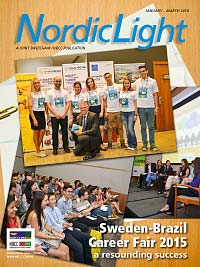 Swedcham—in association with CAE-Eurocâmaras, the EuroChamber’s Mediation and Arbitration Chamber—organized an event focusing on mediation and the Brazilian Legal Landmark, and its impacts in the business world. The goal of the event was to raise awareness on the suitability of commercial mediation as a method for resolving disputes in cross-border transactions as well as in domestic disputes. The increasing globalization requires efficient and reliable alternative systems to increase the legal security and mediation is an advantageous tool.
Swedcham—in association with CAE-Eurocâmaras, the EuroChamber’s Mediation and Arbitration Chamber—organized an event focusing on mediation and the Brazilian Legal Landmark, and its impacts in the business world. The goal of the event was to raise awareness on the suitability of commercial mediation as a method for resolving disputes in cross-border transactions as well as in domestic disputes. The increasing globalization requires efficient and reliable alternative systems to increase the legal security and mediation is an advantageous tool.
The event took place on September 24, 2015, at the premises of Swedcham in São Paulo and counted with the presence of representatives from international companies, and guest speakers Fernanda Levy, Alessandra Fachada Bonilha and Patricia Freitas Fuoco, as well as Jonas Lindström, the Chamber’s Managing Director.
Jean François Teisseire, Secretary of CAE-Eurocâmaras, opened the session explaining CAE’s mission. Conceived almost 15 years ago by the leading bilateral European Chambers of Industry and Commerce, CAE is the only multilateral and multicultural organization explicitly focused on cross-border mediations and arbitrations especially involving European investors, as well as prepared to handle domestic conflicts. Fernanda Levy, a recognized mediator and collaborative lawyer, talked about how mediation has been developing in Brazil and how its effective use plays a fundamental role in companies’ business strategies. She brought significant information about mediation in Sweden and shared with the audience her huge experience in complex commercial cases resolved through mediation in Brazil.
Furthermore, we listened to Alessandra Fachada Bonilha, who is a lawyer and a well-known mediator with a huge experience in corporate governance and family business. She illustrated the session with corporate matters involving shareholder disputes.
Being one of the guest speakers, I added the importance of a strategic vision in the business mediation advocacy. For better assisting their clients in domestic or cross-border mediations, lawyers must be experienced in the dynamics of the mediation process, and adopt a collaborative approach.
In a country with a costly and time-consuming litigation system, and almost 100 million lawsuits, according to the recent report published by the National Council of Justice, alternative methods for resolving disputes have been increasing sharply in the last few years.
Commercial mediation has been used in Brazil with reasonable success as an effective method for resolving a wide variety of conflicts.
Mediation is a structured process of resolving commercial disputes facilitated by a third-party neutral mediator who assists the parties to improve or re-establish their communication, and possibly reach an agreement. It is faster and less costly than a lawsuit or an arbitration procedure. The parties are empowered to move on and reach their own solution.
Attempting to reduce the caseload of the Judiciary, the new Brazilian Civil Procedure Code (enacted in March 2015) favored mediation and other alternative dispute resolution methods. A few months later in June, 2015, the Mediation Act (Law 13.140/15) was enacted establishing the use of mediation in out-of-court disputes and in judicial proceedings.
This legal framework is an important step not only to foster and enhance the use of mediation in Brazil, but also to raise Brazil itself, as an important global player, to the same path of well-developed countries where mediation is already part of the culture.
The initiative of Swedcham in association with CAE-Eurocâmaras is an important step for disseminating the culture from an adversarial mindset to a problem-solving approach.
Patricia Freitas Fuoco was consultant at Pacheco Neto Sanden Teisseire Law Firm.



